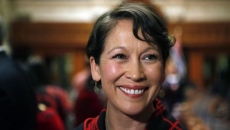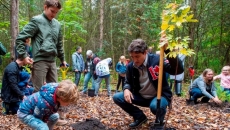Canadians in some parts of the country saw surgeries postponed, access to COVID-19 testing reduced and a return to class delayed as provinces continued to struggle on Tuesday with a sustained wave of coronavirus cases and hospitalizations.
Ontario health officials said the province would delay all surgeries deemed non-urgent starting Wednesday as the province grapples with the dual pressures of rising admissions and increased staff absences.
Chris Simpson of Ontario Health, the agency overseeing the health system, said staff need to be redeployed to hospital wards dealing with shortages or to help admit people who are sick with COVID-19. More patient transfers are also likely as hospitals reach capacity limits, he said.
"We need to be prepared for a period of time where the care that's being delivered is not the kind of care we would want to deliver," he said, adding that authorities were doing everything possible to mitigate the risk.
While fewer people are experiencing COVID pneumonia during the Omicron wave, many are being hospitalized for short stays or with chronic illnesses worsened by a COVID-19 infection, Simpson said.
COVID-19 cases and hospitalizations have been surging across the country, driven by the highly transmissible Omicron variant.
Quebec on Tuesday announced it was limiting access to COVID-19 PCR tests to "high risk" individuals, and was asking the general public to stay home and isolate if they have symptoms instead of seeking a test.
The decision is intended to ensure there are enough tests for vulnerable people such as hospital patients and care home residents amid unprecedented demand and expected supply shortages, a health official said.
The province also became the latest to reduce the recommended minimum isolation time for vaccinated individuals to five days, down from 10. Health-care workers in direct contact with patients must stay home for seven days before returning to work.
Dr. Marie-France Raynault, a senior strategic medical adviser to Quebec public health, told a technical briefing that, given the high levels of infection, a 10-day isolation period would "paralyze" society.
"If we don't have firefighters to put out fires, if we don't have police officers to ensure security, if we don't have delivery people so there's food, if we don't have bus drivers, that is also a consideration that we take into account in public health," she said.
She said research suggests people are most contagious in the two days before they develop symptoms and in the two to three days after symptoms appear.
Quebec on Tuesday reported a 196-person increase in the overall number of people hospitalized with COVID-19, as well as 21 more deaths linked to the pandemic.
Providing COVID-19 booster shots is seen as key to fighting the pandemic, and Prime Minister Justin Trudeau on Tuesday joined the growing ranks of Canadians who are rolling up their sleeves.
Trudeau received his third shot at an Ottawa pharmacy Tuesday morning, where he could be seen chatting with the pharmacist as the shot was prepared. Afterwards, the prime minister flashed a thumbs up and urged Canadians to get vaccinated.
While Ontario opened eligibility for booster shots to all residents 18 and older in mid-December, Quebec has been slower to expand to the general population. Quebecers aged 55 and over became eligible to book appointments on Tuesday, with the age limit set to drop gradually to include all adults by Jan. 21.
Saskatchewan, meanwhile, said it was opening up fourth doses to people who are immunocompromised, provided it has been three months since their third dose.
Many provinces have also chosen to delay the beginning of in-person schooling in the new year in an effort to limit the spread of Omicron.
Manitoba, which had already pushed back the post-holiday return to Jan. 10 from Jan. 6, announced Tuesday that it was delaying the return of in-person learning by another week. Remote classes will begin next week, Premier Heather Stefanson said.
Prince Edward Island also announced that it will extend public health measures, including online learning in schools, until at least Jan. 17.






